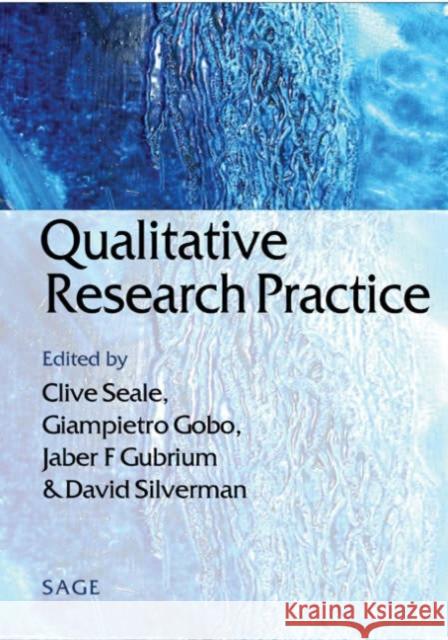Qualitative Research Practice » książka
Qualitative Research Practice
ISBN-13: 9780761947769 / Angielski / Twarda / 2004 / 640 str.
This comprehensive collection of almost 40 chapters - each written by a leading expert in the field - is the essential reference for anyone undertaking or studying qualitative research. It covers a diversity of methods and a variety of perspectives and is a very practical and informative guide for newcomers and experienced researchers alike' - John Scott, University of Essex The best ways in which to understand the issues and processes informing qualitative research is to learn from the accounts of its leading practitioners. Here they come together in what is a distinctive and wide-ranging collection that will appeal to postgraduates and social researchers in general' - Tim May, University of Salford This excellent guide engages in a dialogue with a wide range of expert qualitative researchers, each of whom considers their own practice in an illuminating and challenging way. Overall, the book constitutes an authoritative survey of current methods of qualitative research data collection and analysis' - Nigel Gilbert, University of Surrey Learning to do good qualitative research occurs most fortuitously by seeing what researchers actually do in particular projects and by incorporating their procedures and strategies into one's own research practice. This is one of the most powerful and pragmatic ways of bringing to bear the range of qualitative methodological perspectives available. The chapters in this important new volume are written by leading, internationally distinguished qualitative researchers who recount and reflect on their own research experiences as well as others, past and present, from whom they have learned. It demonstrates the benefits of using particular methods from the viewpoint of real-life experience. From the outside, good research seems to be produced through practitioners learning and following standard theoretical, empirical and procedural formats. But from the inside we learn that qualitative research (like other forms of scientific endeavour) is also a biographical engagement, rendering its scholarly and practical contributions in its own terms. Standards take on practical meaning as the distinct activities of qualitative research resonate throughout the enterprise, complicating its accountability to itself and to others. In an authoritative yet accessible manner, Qualitative Research Practice reveals the special features of this engagement, teaching us that qualitative research is as much a craft and practice as it is a way of knowing. Presenting a comprehensive examination of contemporary and traditional varieties of qualitative research practice, Qualitative Research Practice will be an invaluable resource for advanced students and researchers in any discipline. It is an essential and definitive guide to the major forms of qualitative methods in use today, written by leaders in the relevant fields of research practice.











